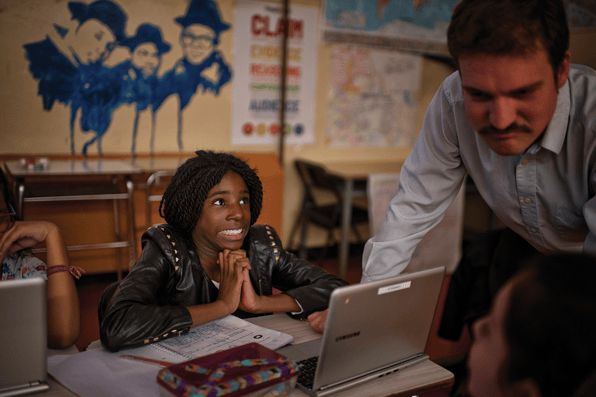
Our Evidence-Based Arguments for Why Teachers Are Awesome
By now you know that we're all about the evidence-based arguments over here at ThinkCERCA. There's no better way to prepare students for life than by teaching them how to make Claims, support their claims with Evidence, explain their Reasoning, address Counterarguments, and use Audience-appropriate language.
Given our penchant for CERCAs, a few team members decided to construct their own evidence-based arguments about the awesomeness of teachers in honor of National Teacher Appreciation Week.
Claire Podulka, Managing Editor
Claim: Teachers have the power to change the world.
Evidence: Nelson Mandela, the inspirational activist who led South Africa to freedom, understood the value of great teachers and the education that they provide. He once said, “Education is the most powerful weapon which you can use to change the world.”
Reasoning: Mandela helped end apartheid through his persistence, intelligence, and persuasive rhetoric. He used the tools of his own education, tools teachers had given him along the way, to literally change the world for oppressed South Africans.
Counterargument: Some might say that teachers can only make a difference to the thirty or so students they have in their classroom at any one time. But consider how many people those students will affect in their life, and how many those people will affect, and so on. In this way, the ripple-effect impact of one great teacher can spread across the world in no time.
Audience: Whether the next Nelson Mandela is in your class, or just future doctors, firefighters, writers, mechanics, or entrepreneurs, you’re making all the difference to them—and through them, the world.
Danielle Perlstein, Senior School Partnerships Manager
Claim: Teachers do little things every day that make huge impacts on the lives of their students.
Evidence: Whether it’s asking a question that sparks a classroom debate, influencing a student to raise her hand for the first time that year, or providing positive feedback to a student who has nearly given up.
Reasoning: These everyday acts done by teachers across the world may seem small, but they are making tidal waves of positive impact on students, schools, and their communities.
Counterargument: Sometimes it’s easy to become caught up in test scores and letter grades, but to measure a teacher’s success one needs to also look at the more nuanced acts of encouragement, empowerment and inspiration that are occurring inside their classrooms.
Audience: A teacher’s success can be measured in many different ways, including the subtle ways students’ lives are being positively impacted each and every day.

Elizabeth Riley Boyer is an experienced journalist, digital content strategist, and operations manager. Prior to joining ThinkCERCA, she was part of the founding team at Impact Engine, Chicago’s first social impact investment fund and accelerator. As Impact Engine’s Director of Operations & Communications, Elizabeth oversaw the company’s overall processes, day-to-day planning and finances, curriculum development, marketing strategy, and community outreach.
Elizabeth also spent three years at Chicago magazine, most recently as its Digital Engagement Editor, where she managed the organization’s social media and reader engagement initiatives. Elizabeth also works as a freelance content strategist, writer, and communications consultant. Her recent writings on impact entrepreneurship have been featured by the Huffington Post and Crain’s Chicago Business.
In 2007, Elizabeth helped open a private school for underprivileged children while volunteering for a nonprofit organization in the Dominican Republic. This experience inspired her to quit a paper-pushing job at an insurance brokerage firm to pursue a master’s degree in journalism from Northwestern University. Elizabeth also holds a bachelor’s degree in American studies from the University of Texas at Austin.
